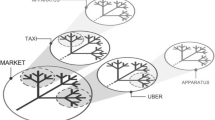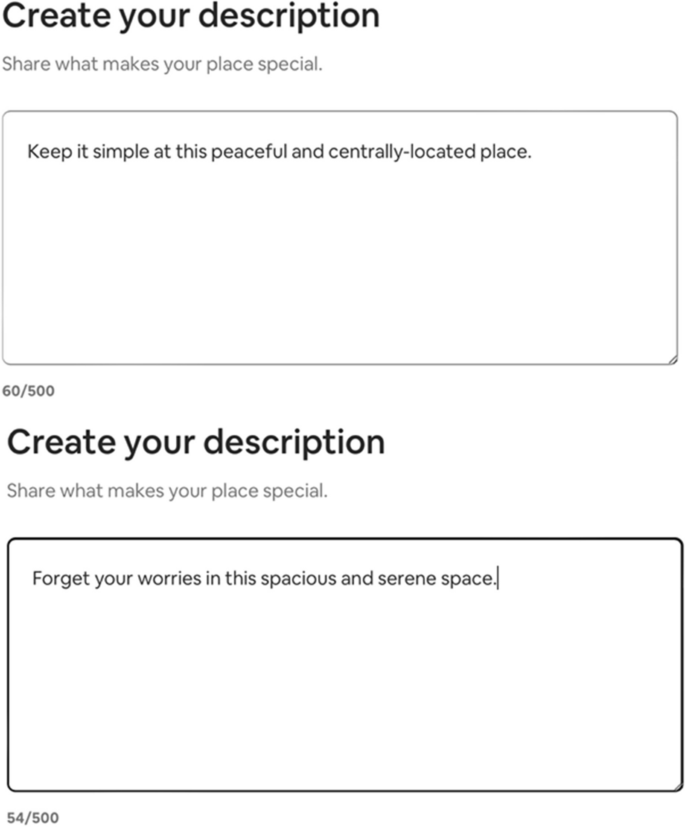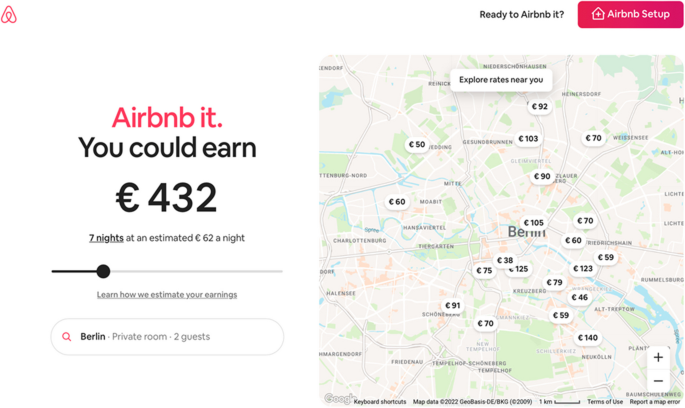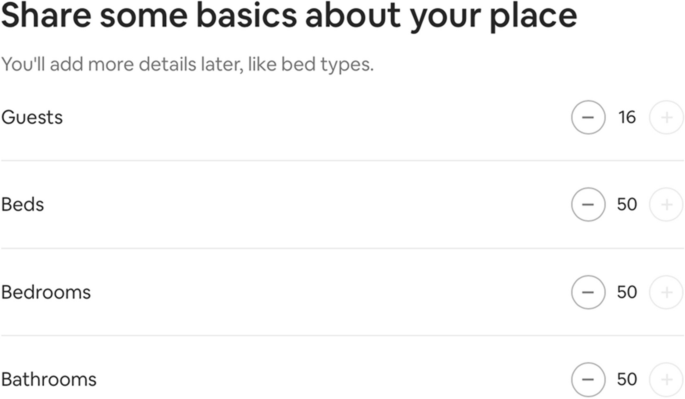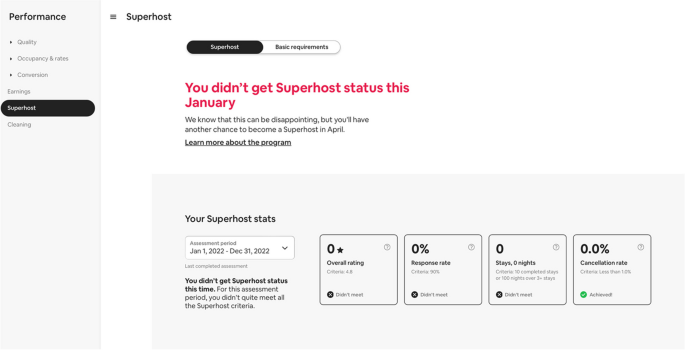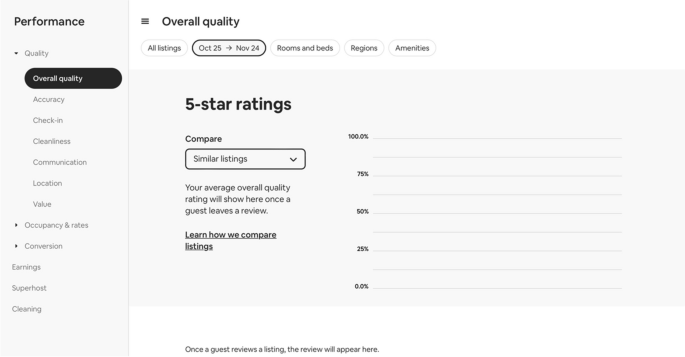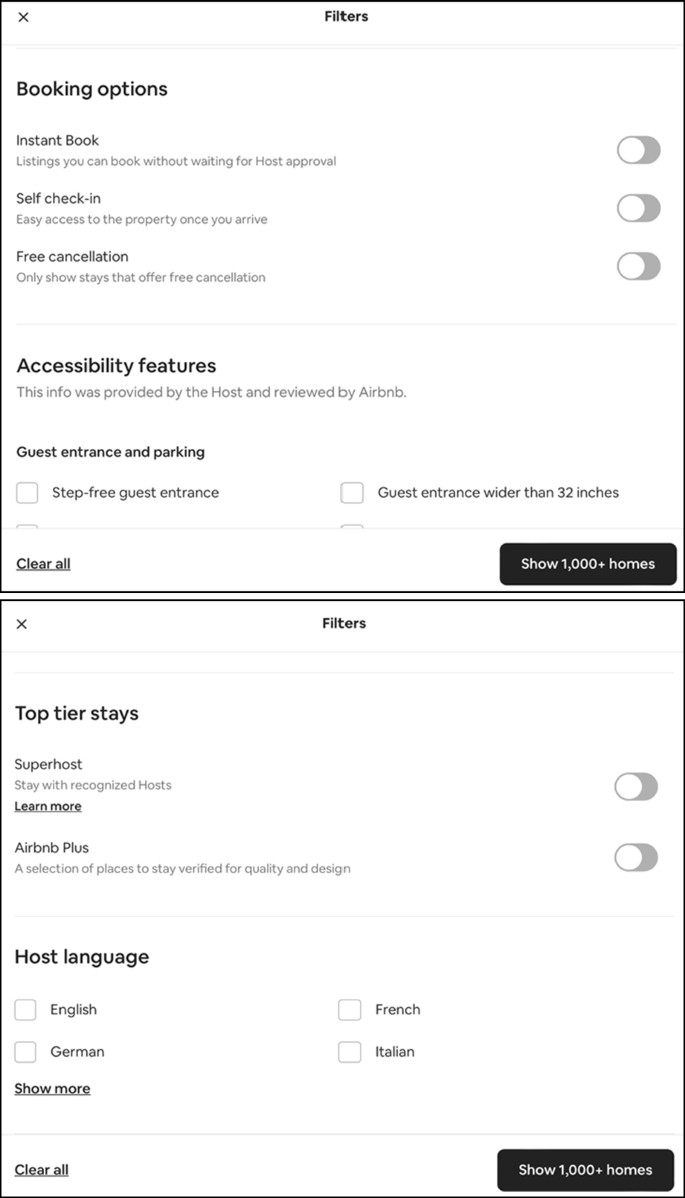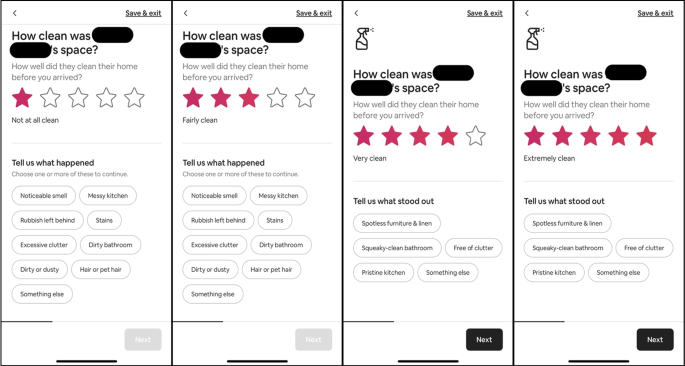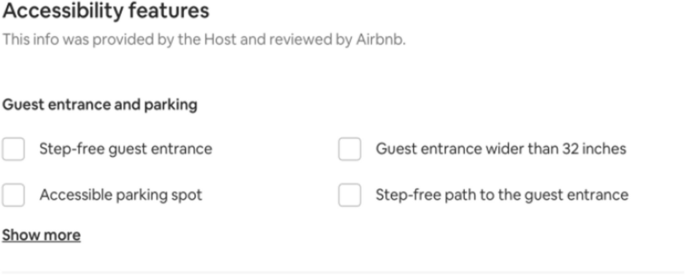Abstract
The paper deploys the disclosive computer ethics (DCE) approach to reconstruct the ethics and politics of one of the sharing economy’s flagships—Airbnb. I investigate Airbnb’s technical design to identify the moral and political values that are embedded in the platform’s technology. I then analyze the platform’s ethics and politics towards a generalization of relevant ethical and political aspects by reconnecting them to the mechanisms, operations, rationales, and ideologies of the sharing economy in general. The paper contributes to the existing literature by linking between the ethics and politics of digital platforms and their technical design, using the case study of Airbnb. Additionally, it explores Airbnb as a specific platform technology with unique ethical and political values. Thus, the paper refutes the neutrality thesis and similar claims made by sharing economy platforms. Finally, the paper makes a methodological contribution to the literature on the ethics and politics of technology. It develops a practical DCE research methodology for uncovering the values, ethics, and politics of digital technologies.
Similar content being viewed by others
1 Introduction
Digital platforms are increasingly influencing multiple facets of modern society. Due to their impact on industries such as tourism and hospitality, food delivery, logistics, workforce coordination, commerce, etc., platforms are becoming the focus of controversy. Advocates tend to emphasize the sharing economy’s positive environmental, economic, and social potential, whereas critics point out the platforms’ working conditions, impact on local communities, bypass of regulations, and neoliberal ideology.
This paper deploys the disclosive computer ethics approach (DCE) (Brey, 2000, 2010) to reconstruct the ethics and politics of one of the sharing economy’s flagships—Airbnb. The sharing economy refers to an economic model, in which digital platforms facilitate P2P (peer-to-peer) based social and economic interactions such as lending, renting, providing, and sharing access to goods and services. Examples of such platforms are Uber (car sharing/ride-hailing), TaskRabbit (freelance labor), and Deliveroo (food delivery). Airbnb is a platform for home-sharing and short-term rentals that was founded in 2008 and became a publicly traded company in 2020.Footnote 1 As of March 2022, Airbnb had 6 M active listings worldwide, 100 K cities in over 220 regions with listings, over 1B guest arrivals, over 4 M hosts, over $180B earned by hosts, and $13.8 K earned by a typical US host (Airbnb, 2022c).Footnote 2 It is often noted that "Airbnb, the world’s largest accommodation provider, owns no real estate" (Goodwin, 2015). This seemingly straightforward observation indicates that Airbnb is a paradigmatic case study for the sharing economy. Furthermore, due to Airbnb’s normative impact on the sharing economy’s mainstream platform modelFootnote 3 (Stone, 2017), it is an instructive case study to investigate the sharing economy’s ethics and politics. The paper treats digital platforms’ technical design and its intersection with their institutional structures as a starting point. I use the disclosive analysis to investigate Airbnb’s technical operations and identify the moral and political values that are embedded in the platform’s technology. Based on the identified values, I analyze what constitutes the platform’s ethics and politics from a broader perspective. This perspective enables a generalization of certain findings by relating them to the mechanisms, operations, rationales, and ideologies of the sharing economy.
Current research on platforms’ ethics and politics such as (van Dijck et al., 2018; Lehdonvirta, 2022; Scholz, 2017; Srnicek, 2016; Woodcock & Graham, 2020) tends to concentrate on the meta-level (e.g., economics conditions, infrastructures) without a concrete account of how the platforms’ technology is built and used to promote particular values. On the other hand, research accounts that focus on specific functionalities or stakeholders deliver valuable insights from an ethical and political point of view but fail to deliver a multidimensional account of the platforms’ ethics and politics and often miss the connection to the meta-level. For example, studies of Airbnb focused on the platform’s algorithmic management’s impact on hosts (Cheng & Foley, 2019; Christensen, 2022; Jhaver et al., 2018), its use of gamification methods (Sigala et al., 2019), its review system (Bridges & Vásquez, 2018; Lawani et al., 2019), or a biopolitical analysis of Airbnb (Roelofsen & Minca, 2018).
The paper’s main aim is to relate digital platforms’ ethics and politics to their technical design using the case study of Airbnb. Additionally, it explores Airbnb as a specific platform technology with unique ethical and political values. Thus, the paper refutes the neutrality thesis and similar claims made by mainstream sharing platforms. Finally, this work develops a practical DCE research methodology for uncovering the values, ethics, and politics of digital technologies. Thus, the paper makes a methodological contribution to the literature on the ethics and politics of technology.
The paper is structured as follows: the following section sketches the research’s theoretical background regarding the morality and politics of technology as well as the chosen DCE approach. The third section descriptively discusses the disclosive analysis’ findings (the term ethical and political operations is introduced as an identifier of values’ manifestation in technology, see Section 2). In the fourth section, I reflect upon the findings and discuss Airbnb’s observed ethics and politics. The section moves from the concrete to the abstract, situating the findings in the broader context of the sharing economy and its organizing principles. The paper concludes by addressing the study’s limitations and concluding remarks.
2 Theoretical Background and Methodology
2.1 The Morality and Politics of Technology
The nature of the relationship between values and technologies is a central issue in the philosophy of technology. The positions on this issue vary from technology’s complete neutrality on the one hand and technology being value-laden on the other hand. The neutrality thesis claims that technological artifacts have no inherent values, politics, or consequences—technology is neither inherently good nor inherently bad. It is rather the human agency of those using the technology, which is responsible for the outcomes and consequently, for the technology’s social and political implications. In other words, according to the neutrality thesis, what matters is how we as individuals or as a society use technology (Pitt, 2014). Mainstream sharing platforms often make claims resembling the neutrality thesis to fend off criticism: that platforms are mere intermediaries/marketplaces and therefore not responsible for the social and political consequences. For example, Airbnb and Uber invest efforts to be acknowledged by European courts as Information Society Services (ISS) instead of Material Services, which has significant legal and regulatory implications for their liability (Filatova-Bilous, 2021).
In contrast, the embedded values approach argues that technologies are value-laden in the sense that they have built-in tendencies to promote or demote certain values. These tendencies promote (or demote) certain ways to use the technology, certain consequences of the technology’s use, or certain social arrangements around the use of the technology. This, however, does not imply a deterministic view of technology – technological artifacts do not possess absolute built-in consequences, individuals are not completely determined in their use of technological artifacts, and the uses of technologies may vary between contexts (Brey, 2010). Looking at the morality of technology more broadly, decisions regarding technologies’ design, their use, and the contexts in which they are embedded can have not only moral but also political consequences (Feenberg, 2002; Introna, 2007; Sclove, 1995; Winner, 1980). Proponents of this notion address the politics of technological artifacts in terms of power relations, social order, political conditions, and economic relations.
2.2 Disclosive Computer Ethics
The DCE approach was designed as a tool to identify and evaluate embedded values, moral and political issues, and normativity in morally opaqueFootnote 4 information technologies, applications, and practices (Brey, 2000, 2010; Introna, 2005). For example, DCE has been used to analyze facial recognition systems, plagiarism detection systems, search engines, and the social media platform Facebook (Introna, 2005, 2007; Light & McGrath, 2010). This paper’s methodology follows the descriptive DCE approach (Introna, 2005, 2007), which focuses on revealing the hidden values, interests, and politics in technologies and related practices without predefining a desirable set of values that the technology should realize. Such a predefinition is in itself a normative political act of closure—it limits the ways we can approach, evaluate, and (re-)design technologies (Introna, 2005, 2007). Additionally, I incorporated the disclosure level from the normative DCE approach (Brey, 2000, 2010) in the research design. At the disclosure level, values are used in their loose, common-sense definition to analyze the technology and evaluate how the technological features promote or demote these values. Deploying a pre-theoretical approach is important for uncovering and evaluating the identified values’ meaning in the research’s particular socio-technical context. It is also crucial for avoiding normative decisions (predefining a certain understanding of a value) that limit the analysis and its potential. By integrating aspects of both DCE I aim to achieve a more robust methodology that harnesses DCE’s full potential.
Due to its focus on technical investigations, DCE’s strength is a systematic evaluation of values with varying degrees of embeddedness and intentionality in the technology (Shilton et al., 2014) and it can be embedded in broader research frameworks such as the evaluation of technological change (O’Neill, 2022). The descriptive DCE approach applied in this research delivers insights into (opaque) technologies’ embedded values and makes the connection between technologies’ design and their impact visible. Embedded values are more important than proclaimed values (values stated by technology companies) since they are values that actually manifest in technology and therefore, create an effect. In other words, embedded values are technology’s tendency to produce certain effects; that is, effects that promote a particular value. Proclaimed values, on the other hand, may not correspond with actual values. Finally, the descriptive DCE approach has a normative potential for addressing technologies’ effects through technical adjustments, designing alternative technologies with more desirable effects, reinforcing technology firms’ responsibilities, and designing effective regulations and legislations.
Finally, due to their central role in the presented research, the following terms (as well as the relationships between them) require some clarification:
-
Moral and political values refer to values such as fairness, autonomy, freedom, democracy, etc. Using a pre-theoretical approach, I address the values in their loose, common-sense understanding in the context of their usage.
-
Ethics refer neither to specific moral theories nor to practical reasoning about right and wrong, actions or rules, or the good life. Instead, here, I regard ethics as referring to the moral beliefs (e.g., values, principles, rules) and attitudes of particular individuals, groups, and institutions, and to how these moral beliefs are expressed in actions, behaviors, institutional, social, and technical structures.
-
Ethical operations are actual operations such as functions, policies, actions, and behaviors through which a value is embedded in the technology. Ethical operations are, in a way, the mechanisms that bring particular values into action, for example, by promoting certain interests, intentions, and outcomes while demoting others. This concept enables the analysis to move from the mere disclosure of “static” values to the analysis of the mechanisms that bring them into action and their influence on the context in which the technology is used (e.g., users, indirect stakeholders, institutions, and society at large).
-
Politics refer to the domain that addresses the distribution of power and production of social order.Footnote 5 This understanding includes both the reinforcement and manifestation of existing power distribution and social order in society and particular settings and the introduction of change (redistribution, adjustment, correction) in the power distribution between individuals and groups as well as the production and promotion of novel aspects (e.g., social structures, institutions, cultural norms, values) that deviate from the existing social order.
-
Political operations are the materialization and operationalization of politics (in their aforementioned understanding) in technology. Through these operations, technologies constitute mechanisms (that can be used) for (re-)distributing power, reinforcing concrete structures and aspects of the existing social order, or undermining these structures.
2.3 Research Design
Drawing on the described methodology, the research design consists of five tasks described in Table 1. Figure 1 illustrates the tasks’ integration as an iterative research process: task 1 was conducted before tasks 2–4. Tasks 2 and 3 were conducted in parallel between November 2022 and March 2023 and included several iterations for each task. Task 4 was conducted parallel to tasks 2–3 and after their completion to inform and support these tasks’ findings. The finding analysis (task 5) took place after tasks 2–4 completion.
3 Findings
3.1 Identified Values—an Overview
As a result of the iterative research approach outlined in the methodology section, tasks 2–4’s findings co-emerged and were documented in consolidation. Accordingly, the following summary addresses these tasks’ findings in consolidation. The disclosive analysis findings can be roughly divided into two categories. First are values that concern the platforms as an institution and/or technology. The identified institutions-regarding values included accountability, commodification, democracy, environmental sustainability, market freedom, privacy, professionalism (of the platform), privacy, safety, social well-being, transparency (mostly critical notions), and trust. The second category concerns the platform’s relation to individual members and users. These values included accessibility, autonomy, diversity, economic sustainability (of the hosts), fairness, individual well-being, individualism, and professionalism (of the hosts).
The following analysis focuses on values, for which the findings indicate a substantial contribution to Airbnb’s ethics and politics. These values are manifested in ethical and political operations with a clear impact on the platform’s workings and its moral and political implications. For example, values that are apparent in ethical and political operations across a variety of platform functionalities or in affordances that influence central aspects of platform use (such as hosts’ labor).
3.2 Airbnb’s Ethical and Political Operations
Airbnb’s design includes separate user journeys for different stakeholders as well as the underlying mechanisms to facilitate their interactions and orchestrate the marketplace’s dynamics. The guests’ user journey focuses on searching for and booking accommodations and resembles similar travel and accommodation booking platforms. The host’s user journey includes a workflow to add listings and a variety of subsequent functionalities to manage the listings, communicate with the guests, etc. The platform facilitates the required interaction between hosts and guests using a variety of functions (e.g., booking, payment, review, messaging) and services (e.g., customer service hotline, guarantee & insurance).
3.2.1 Professionalism
Professionalism is understood as the acquisition and application of standards, practices, experiences, and motivations that are associated with a profession or a field of activity (tourism and hospitality). It applies to the professionalism of both hosts and the platform itself.
Airbnb deploys various methods to promote the professionalization of hosts. Airbnb prescribes aesthetics for profiles and listings (Christensen, 2022; Roelofsen & Minca, 2018), which are visible in standards and “best practices” for listings’ visual aesthetics, copywriting, and pricing. To professionalize hosts’ listings according to its standards, Airbnb implemented technical affordances in the listing process: algorithms suggest the best photos to use in the listing (without specifying the criteria), pre-formulated texts for the description field (based on information provided in earlier steps) (Fig. 2), and price ranges based on location and amenities (Fig. 3). Additionally, Airbnb promotes professionalization using functionalities such as automated communication with guests (scheduled messages, drafts with personalization options), a dashboard to manage listings, rule-based pricing (seasonal pricing, promotions, early bird, length of stay discount), an insights page with statistical data on listings' and transactions' performance, tools for hosting teams with multiple listings (e.g., task management), and a Pro Marketing Page for users with more than six listings. Hosts’ profiles include metrics such as the host’s response rate and response time (Fig. 4), thus, setting further incentives for hosts to improve their metrics. Lastly, top-performing hosts that meet certain requirements automatically become "Superhost" (Airbnb, 2022h) (see Section 3.2.3). The Superhost criteria and listings’ metrics create affordances for hosts to follow Airbnb’s homogenized vision of professional hospitality.
As a platform, Airbnb’s look and feelFootnote 6 resemble professional travel and accommodation booking platforms. This gives the user the impression of booking professional accommodations, rather than an interim sublet of another person’s home. Airbnb also professionalizes its services beyond home-sharing by implementing additional functionalities such as features for booking business travel. Furthermore, Airbnb strives to professionalize its platform by expanding and enhancing its functionalities using the expertise and dedicated technologies of companies from the tourism and hospitality sectors. It uses acquisitions to integrate the acquired companies’ products into the platform or use their expertise to develop Airbnb’s functions and services. Amongst others, Airbnb acquired the online city guide NabeWise, the travel activities marketplace Trip4real, the event venues platform Aarhus, and the travel accessibility startup Accomable (Business Insider, 2020; Mergr, 2022).
3.2.2 Commodification
Commodification, understood in this context as the transformation of hitherto private (online & offline) resources, goods, services, ideas, personal information, etc. into objects of economic value, is evident on various dimensions of the platform.
The platform includes affordances that incentivize commodification: Airbnb technically facilitates only fee-based rentals and inhibits other forms of sharing such as barter exchange or couch surfing.Footnote 7 From the hosts’ perspective, the user journey’s first step ("Airbnb your home") leads the users to a revenue estimation page (Fig. 5), which is later concretized based on the listing’s location, amenities, and nearby prices and demand. Also, Airbnb implemented a “self-check-in” option that promotes the use of labor-efficient technologies such as lockboxes (Fig. 6). These are important features for commercial accommodations with frequent exchange of guests and no personal interaction with the host. By incentivizing hosts to offer them, Airbnb promotes an increasingly commercial character in private home-sharing accommodations as well as the transformation of residential apartments into commercial ones (so-called Airbnb flats). In addition to these affordances, Airbnb refrains from limiting or regulating platform uses that potentially lead to commodification. Airbnb’s yearslong refusal to technically enforce local regulations such as allowance/registration codes or the maximal number of guests (16), rooms (50), beds (50), and bathrooms (50) per listing (Fig. 7) that lay beyond mere home-sharing of one’s bedroom or flat are examples for such (lacking) limitations.
3.2.3 Autonomy and Individual Well-Being
Autonomy is understood as the individual’s ability to independently decide on issues related to the platform and the platform work without limiting their political, personal, etc. freedom and without undue external controlling influences. Individual well-being refers to how platform-related activities (e.g., platform work, consumption) contribute to or subtract from the individual’s ability to lead fulfilling lives in which they can pursue their own needs and desires. Airbnb uses different “carrots and sticks” to regulate hosts’ behavior and platform usage to match its interests and vision. These measures include algorithmic management, information asymmetry, and gamification. Algorithmic management and information asymmetry affect hosts’ autonomy by coercing them to comply with the algorithms. They also affect hosts’ well-being by promoting anxiety and feelings of loss of control (Cheng & Foley, 2019; Lee et al., 2015). Additionally, gamification techniques that use experiences similar to those of game-play to influence user motivation and engagement (Deterding et al., 2011; Hamari, 2019) are considered to harm their autonomy (Kim & Werbach, 2016; Marczewski, 2017).
To reach the Superhost status, hosts have to meet certain metrics (min. 10 trips or 3 reservations that total at least 100 nights, over 90% response rate, less than 1% cancellation rate, and 4.8-star rating) (Airbnb, 2022h). Hosts that meet the requirements are awarded the Superhost status attached to their profile (Fig. 4), higher visibility in search results, being featured in promotional emails, and professional benefits (e.g., business support, exclusive events, educational content). The Superhost status is regularly re-evaluated and hosts can lose it if they fall behind the metrics (Airbnb, 2022g, h). Beyond the Superhost status listings show guests the host’s response rate and response time and the host dashboard (“Insight Page”, Figs. 8 and 9) allows hosts to compare their metrics with similar listings, thus putting hosts under further pressure to continuously maintain and improve their metrics. Also, the search results prioritize listings with higher availability and flexibility (Airbnb, 2022g), potentially putting hosts under pressure to offer more flexible conditions and availabilities than they desire. Airbnb promotes its Instant Booking functionality (bookings without prior interaction between host and guest) by creating affordances for hosts to enable it during the listing process and by placing Instant Booking-listings higher on the search results (Fig. 10). However, in some cases, Airbnb takes design measures that enable hosts to regain some autonomy. For example, hosts can define advance notice time and pose additional requirements such as identity verification or a good track record (guests without negative reviews or incidents) for Instant Bookings (Airbnb, 2022d). Lastly, gamification techniques such as the pursuit of ever-changing goals (Superhost status), their visual recognition via benefits and “badges” (on the host’s profile, Fig. 4), and users’ ability to customize some of the game mechanics (to create meaningful goals and internalize the game activities) are apparent in Airbnb’s design (Sigala et al., 2019) and reaffirmed by hosts’ perception of the system (Christensen, 2022).
3.2.4 Trust and Safety
Trust refers to the conditions (e.g., structures, mechanisms, social conditions) that foster confidence in the ability, integrity, and character of unfamiliar individuals to foster economic transactions and/or social interactions. It can be considered as interpersonal trust (between peers) and institutional trust (in the platform institution itself). Additionally, in home-sharing and the hospitality sector, the issue of trust is directly related to the safety (being protected from danger or harm in the interaction that was mediated by the platform) of guests, hosts, and their property.
In the sharing economy, reputation systems (peer ratings and reviews) are considered crucial for building interpersonal trust. However, Airbnb’s review system’s design heavily influences the neutrality and transparency of reviews and, therefore, its ability to foster trust between unfamiliar users: users cannot see the other party’s review until publication, the reviews are published after both hosts and guests submitted their reviews or a 14 days-period has ended, and users can respond to reviews 30 days after their submission. The review workflow itself guides the user through specific categories (general, check-in, cleanliness, listing’s accuracy, host’s communication, location, value for money, and writing a review text).Footnote 8 For each category, the guest can give 1–5 stars and select additional information from a pre-defined list (the available parameters are displayed based on the selected stars). Interestingly, 1-to-3-star ratings are offered with the same negative parameters (e.g., noisy, inconvenient location, dirty or dusty) and 4–5-star ratings are offered with the same positive parameters (e.g., pristine kitchen, friendly, beautiful surroundings) (Fig. 11). Lastly, there is no option to leave anonymous reviews. Instead, the platform encourages users to give “helpful” advice in a private message, thus keeping critique from the platform’s public areas. In 2019 Airbnb instated a review policy against irrelevant and biased reviews and in 2022 introduced ways for hosts to dispute retaliatory reviews. While Airbnb does not manually moderate reviews, a detection algorithm proactively analyzes reviews for signs that question their “genuineness” (e.g., fake stays) (Airbnb, 2019, 2022b, m).
Airbnb goes to great lengths to promote institutional trust: the AirCover program provides hosts with damage protection for the property itself as well as valuables, parked cars, and boats on the property (Airbnb, 2022j). In some cases, Airbnb verifies guests’ identity (name, address, government ID) and runs background checks on US guests (Airbnb, 2022n). Also, a screening technology enrolled in 2022 evaluates approx. 100 reservation factors of guests, hosts, and third parties and blocks certain bookings (while redirecting the guest to an alternative listing/accommodation type) to reduce the chance of disruptive parties and property damage (Airbnb, 2022j, k). However, Airbnb remains vague on which factors are checked and which third parties are involved.
Airbnb takes additional measures to promote safety. The platform anonymizes the listing’s location (e.g., listings from the same building are spread in the map view); requires hosts to give detailed information on items such as security cameras, weapons, and dangerous animals (during the listing process); offers a 24/7 safety hotline; prevents guests under 25 without positive reviews from booking a listing near their living area; and prohibits one-night stays over holidays such as Halloween, Fourth of July, and New Year’s Eve (in the US). Measures such as government ID verification or holiday restrictions, however, are not globally available due to different cultures, regulations, or countries in which IDs are difficult to obtain.
3.2.5 Social Well-Being
Social well-being is understood as the platforms’ functions and actions to promote flourishing societies on various levels. These include social well-being in the communities (both within the platform and in which the platform operates) and in society at large. Airbnb’s operations expose several dimensions of the platform design’s relation to social well-being: first, fostering interpersonal and social ties can promote social well-being within the platform and the activities it facilitates (and potentially lead to the emergence of communities). Second, taking measures to ensure that the platform itself, the interactions it fosters, and the communities that emerge are free of discrimination (e.g., between hosts and guests). Finally, addressing the well-being of indirect stakeholders (particularly neighbors) is crucial for promoting social well-being in the communities, in which the platform operates.
Fostering interpersonal and social ties is arguably built-in to Airbnb’s core functionality as the platform connects guests and hosts that accommodate them in their private homes. However, the technical investigation reveals that the platform’s design contains various affordances that suppress the creation of such ties: Airbnb actively promotes instant bookings (without prior interaction between hosts and guests), automated communication with guests, the use of lockboxes, and self-check-in. These functions depersonalize the home-sharing experience and therefore, suppress the creation of interpersonal and social ties.
Issues of diversity and non-discrimination are further aspects of how platforms influence interpersonal and social ties in ways that impact social well-being. Diversity refers to the platform's (both as an institution and a technology) conditions to be inclusive for people from different ethnicities, genders, and social and economic backgrounds. In Airbnb’s context, this applies mostly to the inclusion (or rather, discrimination) of guests by hosts and, in some cases, vice versa. After facing criticism for hosts’ racial discrimination against guests, Airbnb implemented technological and institutional changes to fight the phenomenon. For example, Airbnb built a product team that is responsible to fight bias and promote diversity, promoted the Instant Booking function (reduces discrimination by not requiring approval of specific guests), concealed guests' photos until a booking is confirmed (avoids racial and gender biases), implemented a workplace diversity policy (for Airbnb as an employer), and added education and inclusion resources for hosts (Airbnb, 2022a; Murphy, 2016). In 2020, Airbnb launched “Project Lighthouse” which uses data analysis of how hosts and guests use the platform to uncover latent forms of discrimination (Airbnb, 2022a, e). Also, hosts can provide accessibility information for their listings and corresponding search filters (Fig. 12) enable users with special needs to find suitable accommodations.
Several findings shed light on Airbnb’s efforts to mitigate the platform’s negative impact on neighbors: first, Airbnb made the party ban (that was introduced due to the COVID-19 pandemic) permanent in 2022 and introduced technical measures to enforce it (Burstynsky, 2022). The aforementioned reservation screening technology flags suspicious bookings based on guest review history, the distance between their home and the accommodation, and the booking’s timeframe (weekend/holidays) as well as prevents users under 25 from booking entire properties. Second, in 2022, Airbnb introduced its “Ground Rules for Guests” that include rules such as “Noise: Guests should respect designated quiet hours and should not disturb the surrounding community with a disruptive level of noise (ex: loud music, shouting, slamming doors, etc.)” (Airbnb, 2022f). The rules, together with the host’s additional house rules are shown to guests on the listing page, the booking confirmation screen, the trip preparation, and arrival guide emails. Lastly, Airbnb has a Neighborhood Support site, where neighbors can call a support center in urgent cases (e.g., parties and noise complaints) or submit written complaints on non-urgent concerns (Airbnb, 2022i).
3.2.6 Environmental Sustainability
Environmental sustainability refers to the platform’s design and operations in ways that promote different aspects of environmental protection. This applies to the platform's operation (e.g., reduction of waste and CO2 emission in accommodations), its direct impact on stakeholders (e.g., encouraging users to act in an ecologically sustainable manner), and indirect effects (e.g., supporting environmental causes). Notably, the platform’s technical investigations did not uncover any substantial design measures to promote more sustainable travel and accommodation practices (e.g., sustainability information on listings, search filters for sustainable travel/accommodation options, or encouraging users to choose local/non-air travel options).
3.2.7 Accountability and Transparency
Accountability is understood as the platform's responsibility for its activities’ consequences and impact on others. Platforms can manifest this value through the technical implementation of local regulations or other functions that mitigate known negative consequences (as discussed regarding social well-being). As a regulatory response to the surge in illegal accommodations, municipalities require the registration of units that are rented out on a short-term basis. Although such a regulation exists in Berlin since 2018 (Senatsverwaltung für Stadtentwicklung, 2018), Airbnb implemented this requirement in 2022 for new listings and in March 2023 for existing listings (Airbnb, 2022l; rbb, 2022). Additionally, Airbnb’s “responsible hosting” website provides hosts with information on local laws, regulations, taxation, and best practices, but the platform does not take further technical measures to ensure hosts’ compliance.
Transparency refers to the platforms’ operation in such a way that it's easy for others (e.g., policymakers, employees, and community members) to see what actions are performed and how decisions are made. This can include the institution's operational, technical, and data (e.g., data governance) aspects. Concerning technical aspects, platforms can manifest transparency through, for example, open-source code, (semi-)publicly available code documentation, or an accessible demo system for research or training purposes. None of these options are offered by Airbnb. Instead, the platform offers help pages on specific topics such as the search algorithm, reservation screening technology, and the review system. However, this information provides only general orientation for users, while the platform's algorithms and how they operate remain opaque. In other words, transparency as a value is not visible in Airbnb’s technical design.
4 Discussion: Airbnb’s Ethics and Politics
The sharing economy’s narrative argues that digital platforms facilitate so-called “collaborative consumption”. Individuals connect for a wide array of social and economic interactions that involve temporary access to each other’s—both tangible (e.g., rooms, tools, and cars) and intangible (e.g., expertise and time)—resources. In the sharing economy’s context, these resources are considered to be “underutilized” or “idle capacity”, that is, not fully used by their owner as in the case of a spare room or a drilling machine that is used sporadically. This collaborative consumption of shared resources (instead of producing, buying, and disposing of further resources) is said to have positive environmental effects by reducing waste and greenhouse gas (GHG) emissions, the interaction surrounding sharing activities to strengthen social ties between participants and within communities, and the possibility to earn additional income based on ones existing (underutilized) resources to economically empower the middle class. The emphasis on individual users sharing (rather than renting or leasing) their resources as well as on these resources’ underutilized character implies that the non-commercial dimension is central to the narrative, even though it explicitly includes commercial use (Botsman & Rogers, 2011; Frenken & Schor, 2017; Sundararajan, 2017). This narrative has played a central role in Airbnb’s ethos during its founding period (Schor, 2020; Stone, 2017) and is continuously propagated by Airbnb when it faces criticism or lobbies against legislations that threaten its business model (van Dijck et al., 2018; GEWOS, 2014; van Doorn, 2020). Therefore, it is a good starting point for conceptualizing Airbnb’s and other sharing platforms’ ethics and politics. Uncovering possible tensions between the narrative that is promoted by the sharing economy’s proponents (and mainstream platforms’ lobbyists) and the actual moral and political values that are manifested in showcase platforms such as Airbnb is crucial for public debate over sharing platforms and their societal impact.
For this aim, the following discussion takes two steps. First, a synthesis of the disclosive analysis findings will examine how Airbnb contradicts or corresponds with the sharing economy narrative’s key premises. Second, the discussion will zoom out to the sharing economy’s organizing principles that can be derived from the narrative and were apparent in the research’s task 1 (literature review) findings – non-ownership and the marketplace. While the discussion treats them as organizing principles, they have ethical and political implications that are important for conceptualizing Airbnb’s ethics and politics. These two steps are informed by the research methodology’s task 4. The task’s objective is to supplement, better understand, contextualize, and validate the disclosive analysis (tasks 2 and 3) findings with information from relevant sources, including studies on Airbnb’s effects. By making the connection between Airbnb’s actual embedded values and its effects visible, the following discussion underscores platform technology’s role in creating these (desirable and undesirable) effects. This provides empirical validation for the platform technology’s tendency to produce certain effects with moral and political implications. Furthermore, it shows that the values proclaimed by Airbnb and the sharing economy’s narrative do not necessarily correspond with the platform’s actual values. Finally, relating the platform’s effects to its technical design is crucial for validating the disclosive analysis findings and their interpretation.
4.1 Synthesis of Disclosive Analysis Findings
The disclosive analysis of Airbnb exposed many ethical and political operations that do not align with the sharing economy narrative; thus, creating an ethical and political tension between the narrative and the platform’s actual impact. The platform promotes professionalism and incentivizes hosts to meet professional metrics and criteria and to offer multiple accommodations. By favoring such hosts (e.g., with greater visibility), Airbnb disadvantages hosts that occasionally rent out their apartment or spare room (as the narrative would suggest). Additionally, we can distinguish between two dimensions of Airbnb’s commodification tendencies: first, small-scale commodification of living space (e.g., a person rents out a room in her flat) is arguably built into the sharing economy’s narrative and logic of monetizing underutilized resources. Second, through multi-listing,Footnote 9 professionalization, revenue maximization, etc. Airbnb promotes large-scale commodification of living space.Footnote 10 This type of commodification goes beyond—and against—the narrative of the underutilized resource.Footnote 11
The disclosive analysis revealed that Airbnb affects different aspects of social well-being: interpersonal and social ties, the well-being of indirect stakeholders, and diversity and non-discrimination. Early research literature indicated that Airbnb generates the creation of new social ties and that hosts and guests use it for meeting new people (Botsman & Rogers, 2011; Caldicott et al., 2020; Frenken & Schor, 2017). However, this study’s findings show that the platform’s design often suppresses interactions and depersonalizes the home-sharing experience, contradicting the narrative of facilitating interactions and creating interpersonal ties. Additionally, “Airbnb flats” in residential buildings often cause noise disturbances, hygiene problems, and safety issues as well as general feelings of disturbance and insecurity to neighbors due to the constant change of guests (Caldicott et al., 2020; Schäfer & Braun, 2016; Stergiou & Farmaki, 2020). Thus, the platform's use can substantially harm the individual and social well-being of apartment buildings and neighborhoods. While this impact arguably applies to home-sharing in general, Airbnb’s incentivization of professionalization, multi-listing, and commodification exacerbate this impact by increasing the amount of Airbnb flats in neighborhoods as well as the number of guests that enter and leave these accommodations. Airbnb’s technical measures seem effective to mitigate extreme cases such as parties in Airbnb accommodations. However, they do not tackle the general impact that commercial accommodations within residential homes and neighborhoods have on the well-being and safety of the residents.
Airbnb’s anti-discriminatory work is a noticeable finding in which the platform renounces the “neutral intermediary” narrative to promote certain social values. However, research has shown that structural inequalities (e.g., access to capital, living in nonwhite neighborhoods) are reproduced and expressed in platform visibility, rating, revenue, and access to functions such as Instant Booking (Airbnb vs. Berlin, 2015; Airbnb, 2022a; Schor, 2020; van Doorn, 2020). Interestingly, the Instant Booking function exemplifies that the same functionalities can have varying ethical and political implications and even create tension between values, in this case between the guest’s non-discrimination and the aforementioned aspect of hosts’ autonomy and individual well-being.Footnote 12 This shows how the negotiation, weighing, and balancing of values can materialize in ethical and political operations.
Despite environmental sustainability’s central role in the sharing economy narrative, there are very few systematic studies of the sharing economy’s and home-sharing’s (positive and negative) environmental effects (Frenken, 2017a, b). According to an Airbnb study, home-sharing guests generate less energy and water and produce less waste and GHG emissions compared to hotel guests (Airbnb, 2014). Even if taken at face value, the sharing economy’s and home-sharing’s overall rebound effects,Footnote 13 most notably the increase in GHG-intensive air travel due to Airbnb’s involvement in mass tourism, shed doubt on these relative benefits (Frenken, 2017a). The absence of design measures to promote sustainable travel underpins that sustainability does not play a substantial role in Airbnb’s ethics and politics.
Finally, the data and literature on Airbnb indicate two host categories: small-scale hosts that accommodate guests in their homes and multi-listers. Airbnb’s technical design and affordances have fundamentally different ethical and political implications for these two categories. Issues such as Airbnb’s affordance of professionalism, algorithmic management, and gamification directly affect small-scale hosts’ autonomy and individual well-being. In contrast, many of these functionalities are crucial for multi-listers to successfully manage multiple accommodations. Due to their business size and related lack of personal considerations (e.g., who they let inside their homes), multi-listers enjoy an inherent advantage over small-scale hosts in building online reputation, meeting Airbnb’s metrics, and reaching Superhost status. Seen in this way, the sum of these affordances and technological functionalities constitutes political operations that reinforce economic and power structures that privilege multi-listers.
4.2 Airbnb and the Sharing Economy’s Organizing Principles
Non-ownership is, one can argue, one of the sharing economy’s organizing principles. It can be defined in two ways that are inherent to the sharing economy narrative: first, the non-ownership of assets by individuals/users refers to forms of consumption, production, and value generation that are based on access to resources instead of owning them (in contrast to private or joint ownership of these assets). Second, non-ownership of assets by the platform refers to business models and value-generation that are based on outsourcing of factors such as fixed capital (and related maintenance costs) and labor (and related human resources costs), for example, by utilizing the platform users’ assets. The observation that “Uber, the world’s largest taxi company, owns no vehicles. […] And Airbnb, the world’s largest accommodation provider, owns no real estate “ (Goodwin, 2015) expresses the tension that non-ownership generates. Although platforms such as Airbnb might seem assetless, they own the most important asset in the platform and sharing economy – the platform’s software and data (Srnicek, 2016). Since these platforms do not own the assets (accommodations) or employ the labor force (hosts) that generate their revenues, they resort to the software and data as a means to promote their interests, standards, and visions (e.g., of hospitality).
The marketplace that mediates sharing activities is a further organizing principle in the sharing economy. The marketplace’s centrality enabled related ideas of market freedom and self-organizing markets to have a normative impact on the sharing economy narrative. Market freedom refers to the belief in or striving toward an idealized economic model, in which market activity (supply and demand, buyer and seller activities, etc.) serves as regulatory mechanisms, e.g., of prices and behaviors. In the sharing economy, it refers to the platform as a market and the platform as a market player in a specific sector (e.g., tourism and hospitality). Findings that relate to the value of market freedom were predominantly Airbnb-related textual sources (e.g., press statements and help pages) that resonate with the sharing economy narrative. Despite the platform’s role as a marketplace, this value was not apparent in the disclosive analysis findings. Furthermore, this message is not consistent since Airbnb acknowledged in its anti-discriminatory work that the platform contains biases and undertook work to mitigate them. The disclosive analysis findings showed that the platform’s—the marketplace’s—technical design is not built merely to facilitate interactions, but also to shape them and prioritize certain types of interactions over others. Beyond influencing the interactions between users, Airbnb makes it hard and costly for users to deviate from its standards or migrate to a different platform; all of which act as mechanisms to limit market freedom. Thus, Airbnb’s platform design deviates from the self-propagated marketplace narrative.
Consider, for example, the case of reputation systems that document users’ past behavior. These are considered a central regulatory mechanism that generates trust in sharing platforms’ marketplaces. However, the aforementioned affordances in Airbnb’s review system together with behavior norms and economic incentives (e.g., prospective hosts/guests may refuse to interact with users who leave negative reviews which might impact their online reputation) create a self-reinforcing dynamic of linguistically standardized, very positive 4.5–5 stars reviews (Bridges & Vásquez, 2018; Zervas et al., 2021). High-star reviews are essential for Airbnb’s success as a platform by maintaining its image as a high-quality, professional accommodation marketplace. It is therefore questionable, to what extent such a review system promotes the propagated value of interpersonal trust, or whether it serves the goal of generating institutional trust. Furthermore, Airbnb deploys predictive analysis methods to protect the safety and well-being of hosts, their property, and indirect stakeholders (neighbors). These measures are crucial for platform functionalities such as the aforementioned Instant Booking, which are in Airbnb’s business interest but their use requires a great deal of trust from both hosts and guests. In other words, the platform is designed to generate trust in the marketplace itself (i.e., in Airbnb as a platform and an institution), rather than trust in the market dynamics that resonate in the sharing economy narrative. This example illustrates how Airbnb uses its control over the platform software and data to shape the marketplace itself as well as its alleged regulative mechanisms (the review system).
In addition to institutional measures such as lobbying and PR, Airbnb uses its technology to actively shape the markets in which it operates; that is, to impose its interests, values, and visions on the tourism and hospitality sectors. For example, to be in an advantaged position when confronting regulatory measures and lobbying policymakers, Airbnb uses the protection of hosts’ privacy as justification for its lack of transparency towards local authorities (van Dijck et al., 2018; Minca & Roelofsen, 2021). On the surface, this could be understood in terms of a value conflict between privacy and transparency/accountability. However, the conflict’s negotiation takes place between Airbnb and local authorities (or their lawyers) in courts. This could hardly be regarded as an ethical negotiation between a variety of affected stakeholders who can meaningfully impact the negotiation’s outcomes. Furthermore, Airbnb’s aforementioned affordances that pressure hosts to expose personal information on their profiles as well as its reservation screening technology expose an ambivalent approach toward users’ privacy. Put differently, whether Airbnb regards users’ data as something to be protected from trade and exposure between third parties depends on the platform’s business interest.Footnote 14 Airbnb refusal to share data creates an information asymmetry between the platform and the public. Airbnb uses this information asymmetry as a power mechanism to promote its business interests and weaken public institutions and regulations. This makes accountability, transparency, and privacy not only ethical but also political issues. As various researchers note, the practice of using information asymmetry as a power mechanism is common to mainstream sharing platforms in general (van Dijck et al., 2018; Rosenblat & Stark, 2015; Srnicek, 2016; Sundararajan, 2017; Taylor, 2021; van Doorn, 2017).
5 Limitations
This paper has some limitations. First, technical investigations are limited in analyzing the source of embedded values and post-hoc investigations of existing technologies make it difficult to influence these values (an issue known as the Collingridge dilemma) (Shilton et al., 2014). These methodological weaknesses were taken into consideration in the research’s design and scope by focusing on the values that are present in the technology, addressing their sources only if these are explicit in the findings, and refraining from making design suggestions. Second, qualitative ethical research is inherently interpretive and there are subjective elements when identifying and evaluating values. This is a general limitation of the approach which requires an explicit acknowledgment of the researcher’s subjective position (values, judgments, digital literacy, etc.) (Creswell & Creswell, 2018). I considered this in the formal research design and during the empirical work (data collection, interpretation, ethical evaluation, etc.). Lastly, in contrast to relatively static “hardware” technological artifacts (e.g., cars, wind turbines), digital platforms evolve constantly – functionalities are added, removed, and adjusted regularly, often without notification or transparent documentation. Consequently, digital platforms are moving research targets that require suitable theoretical and methodological consideration (van Dijck et al., 2018). This paper’s aim is not to deliver a comprehensive overview of Airbnb’s functionalities. Instead, it concentrates on analyzing and revealing (disclosing) the structures and mechanisms that constitute its ethics and politics. These mechanisms and structures have technical manifestations (ethical/political operations). Accordingly, changes in functionalities that indicate value change are more fundamental and spread across many platform functionalities and mechanisms. This is noticeable, for example, in Airbnb’s anti-discriminatory work. Routine bug fixes and non-fundamental adaptations of existing functionalities, I argue, do not indicate changes in values (e.g., the aforementioned changes in the review system). Therefore, my analysis treated Airbnb’s functionalities as manifestations of underpinning ethics and politics, while keeping an eye out for fundamental functional changes that might indicate value change.
6 Conclusions
By applying the DCE method to Airbnb as a case study, a contradiction emerges between the sharing economy narrative (and, by implication, Airbnb’s propagated company values) and the embedded values in Airbnb’s technology. These insights are not unique to Airbnb and apply to mainstream sharing platforms in general. Additionally, the paper shows that digital platforms’ ethics and politics often extend beyond—or lie beneath—the platform’s direct application (e.g., home-sharing); platforms are designed in ways that promote certain interests, power relations, social visions, and moral impacts. Freed from the neutrality thesis and free market notions, future research can critically address the nature of the markets that sharing platforms such as Airbnb constitute, deliberate on what kind of technologies and “not-free” markets are desirable in the digital economy, and how to technically design them.
Data Availability
The data supporting the findings of this study are partially available within the article. Further data are available from the corresponding author, Shaked Spier, upon request.
Notes
Airbnb expands its scope beyond home-sharing (e.g., local “experiences”, business travel). The following analysis focuses on Airbnb’s core functionality – home-sharing and short-term rentals.
Despite Airbnb’s global image, its operations are local in many ways. Therefore, where relevant, Airbnb’s operations in Berlin are included as a reference point in the analysis.
I use the term mainstream platforms to address the commercial, corporate platform model that dominates the sharing economy. Alternative platform models such as platform cooperative and municipal platforms are excluded from this definition.
Morally relevant features of technology that users are not aware of, do not fully understand, or are unaware of their moral implications.
Social order refers to a system of social structures, institutions, economic conditions, cultural norms, values, practices, etc.
Aspects of the user interface design such as layout, fonts, colors, and shapes (look) and the behavior of interactive and dynamic elements such as buttons and menus (feel).
Hospitality exchange that is not based on monetary exchange.
The category-based review system replaced the single star-rating and text-field in 2019.
The same host offering several listings – an indication of business-like activity.
On the dominantly private housing market, living space is already a commodity. The commodification addressed here, however, refers to the transformation of personal living space (even if rented on the housing market) into a commodity on the hospitality market. For example, so-called “Airbnb flats” that are extracted from the housing market and rented out on a short-term basis.
By autonomy I refer to hosts’ legitimate personal needs. I explicitly do not refer to hosts’ autonomy to discriminate guests based on their race, gender, etc.
Rebound effects occur when the expected saving potentials and efficiency increases (e.g., technologies with reduced GHG emissions) produce a negative overall effect due to behavioral and systematic responses (e.g., heavier use of the technology).
Airbnb’s compliance with China’s controversial surveillance practices exposes further contradictions in its privacy and transparency claims (Minca & Roelofsen, 2021).
References
Airbnb. (2014). Environmental impact of homesharing. http://blog.airbnb.com/environmental-impacts-of-home-sharing. Accessed 1 Feb 2023.
Airbnb vs. Berlin. (2015). Airbnb vs. berlin research project homepage. https://airbnbvsberlin.de. Accessed 20 Oct 2021.
Airbnb. (2019). Airbnb website: Making reviews more relevant and useful for our community. https://www.airbnb.com/resources/hosting-homes/a/making-reviews-more-relevant-and-useful-for-our-community-118. Accessed 29 Dec 2022.
Airbnb. (2022a). A six-year update on airbnb’s work to fight discrimination and build inclusion. https://news.airbnb.com/wp-content/uploads/sites/4/2022/12/A-Six-Year-Update-on-Airbnbs-Work-to-Fight-Discrimination-and-Build-Inclusion-12122022.pdf. Accessed 31 Jan 2023.
Airbnb. (2022b). Airbnb website: A simpler way to dispute retaliatory reviews. https://www.airbnb.com/resources/hosting-homes/a/a-simpler-way-to-dispute-retaliatory-reviews-552. Accessed 29 Dec 2022.
Airbnb. (2022c). Airbnb website: About Us. https://news.airbnb.com/about-us/. Accessed 2 Dec 2022.
Airbnb. (2022d). Airbnb website: Customizing instant book settings. https://www.airbnb.com/help/article/484. Accessed 6 Jul 2023.
Airbnb. (2022e). Airbnb website: Fighting discrimination and building inclusion. https://www.airbnb.com/against-discrimination. Accessed 31 Jan 2023.
Airbnb. (2022f). Airbnb website: Ground rules for guests (community policy). https://www.airbnb.com/help/article/2894. Accessed 1 Feb 2023.
Airbnb. (2022g). Airbnb website: How search results work. https://www.airbnb.com/help/article/39. Accessed 23 Dec 2022.
Airbnb. (2022h). Airbnb website: How to become a Superhost. https://www.airbnb.com/help/article/829/. Accessed 23 Dec 2022.
Airbnb. (2022i). Airbnb website: Neighborhood support. https://www.airbnb.com/help/article/3290. Accessed 1 Feb 2023.
Airbnb. (2022j). Airbnb website: New and improved AirCover for hosts. https://www.airbnb.com/resources/hosting-homes/a/new-and-improved-aircover-for-hosts-469. Accessed 29 Dec 2022.
Airbnb. (2022k). Airbnb website: Reservation screening—potential party risk. https://www.airbnb.com/help/article/3280. Accessed 29 Dec 2022.
Airbnb. (2022l). Airbnb website: Responsible hosting in Germany. https://www.airbnb.com/d/responsible-hosting-germany. Accessed 3 Feb 2023.
Airbnb. (2022m). Airbnb website: Reviews for stays. https://www.airbnb.com/help/article/13. Accessed 29 Dec 2023.
Airbnb. (2022n). Airbnb website: Verifying your identity. https://www.airbnb.com/help/article/1237. Accessed 29 Dec 2022.
Botsman, R., & Rogers, R. (2011). What’s mine is yours: How collaborative consumption is changing the way we live (Rev. and updated ed). Collins.
Brey, P. (2010). Values in technology and disclosive computer ethics. In The Cambridge handbook of information and computer ethics (pp. 41–58). Cambridge University Press.
Brey, P. (2000). Disclosive computer ethics. ACM SIGCAS Computers and Society, 30(4), 10–16. https://doi.org/10.1145/572260.572264
Bridges, J., & Vásquez, C. (2018). If nearly all Airbnb reviews are positive, does that make them meaningless? Current Issues in Tourism, 21(18), 2065–2083. https://doi.org/10.1080/13683500.2016.1267113
Burstynsky, J. (2022). Airbnb rolls out new anti-party tech to prevent unapproved gatherings. Fast Company. https://www.fastcompany.com/90779268/exclusive-airbnb-introduces-new-anti-party-tech-in-the-u-s-and-canada. Accessed 1 Feb 2023.
Business Insider. (2020). Every company Airbnb has acquired since its founding. https://www.businessinsider.com/airbnb-acquisitions-tilt-crashpadder-nabewise-2020-1. Accessed 23 Dec 2022.
Caldicott, R. W., Von Der Heidt, T., Scherrer, P., Muschter, S., & Canosa, A. (2020). Airbnb – exploring triple bottom line impacts on community. International Journal of Culture, Tourism and Hospitality Research, 14(2), 205–223. https://doi.org/10.1108/IJCTHR-07-2019-0134
Cheng, M., & Foley, C. (2019). Algorithmic management: The case of Airbnb. International Journal of Hospitality Management, 83, 33–36. https://doi.org/10.1016/j.ijhm.2019.04.009
Christensen, M. D. (2022). Doing digital discipline: How Airbnb hosts engage with the digital platform. Mobilities, 1–16. https://doi.org/10.1080/17450101.2022.2060756
Creswell, J. W., & Creswell, J. D. (2018). Research design: Qualitative, quantitative, and mixed methods approaches (5th ed.). SAGE.
Deterding, S., Dixon, D., Khaled, R., & Nacke, L. (2011). From game design elements to gamefulness: Defining “gamification”. Proceedings of the 15th International Academic MindTrek Conference: Envisioning Future Media Environments, 9–15. https://doi.org/10.1145/2181037.2181040
Feenberg, A. (2002). Transforming technology: A critical theory revisited. Oxford University Press.
Filatova-Bilous, N. (2021). Once again platform liability: On the edge of the ‘Uber’ and ‘Airbnb’ cases. Internet Policy Review, 10(2). https://doi.org/10.14763/2021.2.1559
Frenken, K. (2017a). Political economies and environmental futures for the sharing economy. Philosophical Transactions of the Royal Society A: Mathematical, Physical and Engineering Sciences, 375(2095), 20160367. https://doi.org/10.1098/rsta.2016.0367
Frenken, K. (2017b). Sustainability perspectives on the sharing economy. Environmental Innovation and Societal Transitions, 23, 1–2. https://doi.org/10.1016/j.eist.2017.04.004
Frenken, K., & Schor, J. (2017). Putting the sharing economy into perspective. Environmental Innovation and Societal Transitions, 23, 3–10. https://doi.org/10.1016/j.eist.2017.01.003
GEWOS. (2014). Airbnb and the Berlin housing market: The impact of Airbnb properties on the housing supply in Berlin. https://www.airbnbcitizen.com/wp-content/uploads/2014/12/AirbnbandtheBerlinhousingmarket.pdf. Accessed 23 Dec 2022.
Goodwin, T. (2015). The battle is for the customer interface. TechCrunch. https://techcrunch.com/2015/03/03/in-the-age-of-disintermediation-the-battle-is-all-for-the-customer-interface/. Accessed 30 Oct 2022.
Hamari, J. (2019). Gamification. In G. Ritzer (Ed.), The blackwell encyclopedia of sociology (pp. 1–3). Wiley, Ltd. https://doi.org/10.1002/9781405165518.wbeos1321
Inside Airbnb. (2022). Berlin (dataset from September 15, 2022). http://insideairbnb.com/berlin. Accessed 2 Dec 2022.
Introna, L. D. (2005). Disclosive ethics and information technology: Disclosing facial recognition systems. Ethics and Information Technology, 7(2), 75–86. https://doi.org/10.1007/s10676-005-4583-2
Introna, L. D. (2007). Maintaining the reversibility of foldings: Making the ethics (politics) of information technology visible. Ethics and Information Technology, 9(1), 11–25. https://doi.org/10.1007/s10676-006-9133-z
Jhaver, S., Karpfen, Y., & Antin, J. (2018). Algorithmic anxiety and coping strategies of Airbnb hosts. Proceedings of the 2018 CHI conference on human factors in computing systems, 1–12. https://doi.org/10.1145/3173574.3173995
Kim, T. W., & Werbach, K. (2016). More than just a game: Ethical issues in gamification. Ethics and Information Technology, 18(2), 157–173. https://doi.org/10.1007/s10676-016-9401-5
Lawani, A., Reed, M. R., Mark, T., & Zheng, Y. (2019). Reviews and price on online platforms: Evidence from sentiment analysis of Airbnb reviews in Boston. Regional Science and Urban Economics, 75, 22–34. https://doi.org/10.1016/j.regsciurbeco.2018.11.003
Lee, M. K., Kusbit, D., Metsky, E., & Dabbish, L. (2015). Working with machines: The impact of algorithmic and data-driven management on human workers. Proceedings of the 33rd annual ACM conference on human factors in computing systems, 1603–1612. https://doi.org/10.1145/2702123.2702548
Lehdonvirta, V. (2022). Cloud empires: How digital platforms are overtaking the state and how we can regain control. The MIT Press.
Light, B., & McGrath, K. (2010). Ethics and social networking sites: A disclosive analysis of Facebook. Information Technology & People, 23(4), 290–311. https://doi.org/10.1108/09593841011087770
Marczewski, A. (2017). The ethics of gamification. XRDS: Crossroads, The ACM Magazine for Students, 24(1), 56–59. https://doi.org/10.1145/3123756
Mergr. (2022). Airbnb mergers and acquisitions summary. https://mergr.com/airbnb-acquisitions. Accessed 23 Dec 2022.
Minca, C., & Roelofsen, M. (2021). Becoming Airbn beings: On datafication and the quantified Self in tourism. Tourism Geographies, 23(4), 743–764. https://doi.org/10.1080/14616688.2019.1686767
Murphy, L. W. (2016). Airbnb’s Work to fight discrimination and build inclusion: A report submitted to Airbnb. https://blog.atairbnb.com/wp-content/uploads/2016/09/REPORT_Airbnbs-Work-to-Fight-Discrimination-and-Build-Inclusion.pdf
O’Neill, E. (2022). Contextual integrity as a general conceptual tool for evaluating technological change. Philosophy & Technology, 35(3), 79. https://doi.org/10.1007/s13347-022-00574-8
Pitt, J. C. (2014). “Guns don’t kill, people kill”; Values in and/or around technologies. In P. Kroes & P.-P. Verbeek (Eds.), The moral status of technical artefacts (Vol. 17, pp. 89–101). Springer Netherlands. https://doi.org/10.1007/978-94-007-7914-3_6
rbb. (2022). Airbnb-Anbieter sollen Registriernummer auch bei bestehenden Inseraten anzeigen. https://www.rbb24.de/wirtschaft/beitrag/2022/10/berlin-airbnb-registriernummer-bestehende-inserate-wohnungsmarkt.html. Accessed 28 Dec 2022.
Roelofsen, M., & Minca, C. (2018). The Superhost. Biopolitics, home and community in the Airbnb dream-world of global hospitality. Geoforum, 91, 170–181. https://doi.org/10.1016/j.geoforum.2018.02.021
Rosenblat, A., & Stark, L. (2015). Uber’s drivers: Information asymmetries and control in dynamic work. SSRN Electronic Journal. https://doi.org/10.2139/ssrn.2686227
Schäfer, P., & Braun, N. (2016). Misuse through short-term rentals on the Berlin housing market. International Journal of Housing Markets and Analysis, 9(2), 287–311. https://doi.org/10.1108/IJHMA-05-2015-0023
Scholz, T. (2017). Uberworked and underpaid: How workers are disrupting the digital economy. Polity Press.
Schor, J. (2020). After the gig: How the sharing economy got hijacked and how to win it back. University of California Press.
Sclove, R. (1995). Democracy and technology. Guilford Press.
Senatsverwaltung für Stadtentwicklung. (2018). Zweckentfremdungsverbot von Wohnraum. https://www.stadtentwicklung.berlin.de/wohnen/zweckentfremdung_wohnraum/. Accessed 5 Feb 2023.
Shilton, K., Koepfler, J. A., & Fleischmann, K. R. (2014). How to see values in social computing: Methods for studying values dimensions. Proceedings of the 17th ACM conference on computer supported cooperative work & social computing, 426–435. https://doi.org/10.1145/2531602.2531625
Sigala, M., Toni, M., Renzi, M. F., Di Pietro, L., & Mugion, R. G. (2019). Gamification in Airbnb: Benefits and risks. E-Review of Tourism Research, 16(2/3). https://ertr-ojs-tamu.tdl.org/ertr/article/view/315
Srnicek, N. (2016). Platform capitalism. Polity Press.
Stergiou, D. P., & Farmaki, A. (2020). Resident perceptions of the impacts of P2P accommodation: Implications for neighbourhoods. International Journal of Hospitality Management, 91, 102411. https://doi.org/10.1016/j.ijhm.2019.102411
Stone, B. (2017). The upstarts: How uber, Airbnb, and the killer companies of the new Silicon Valley are changing the world. Brown and Company: Little.
Sundararajan, A. (2017). The sharing economy: The end of employment and the rise of crowd-based capitalism (First MIT Press paperback edition). The MIT Press.
Taylor, L. (2021). Public actors without public values: Legitimacy, domination and the regulation of the technology sector. Philosophy & Technology, 34(4), 897–922. https://doi.org/10.1007/s13347-020-00441-4
van Dijck, J., Poell, T., & de Waal, M. (2018). The platform society. Oxford University Press.
van Doorn, N. (2017). Platform labor: On the gendered and racialized exploitation of low-income service work in the ‘on-demand’ economy. Information, Communication & Society, 20(6), 898–914. https://doi.org/10.1080/1369118X.2017.1294194
van Doorn, N. (2020). A new institution on the block: On platform urbanism and Airbnb citizenship. New Media & Society, 22(10), 1808–1826. https://doi.org/10.1177/1461444819884377
Winner, L. (1980). Do artifacts have politics? Daedalus, 109(1), 121–136.
Woodcock, J., & Graham, M. (2020). The gig economy: A critical introduction. Polity.
Zervas, G., Proserpio, D., & Byers, J. W. (2021). A first look at online reputation on Airbnb, where every stay is above average. Marketing Letters, 32(1), 1–16. https://doi.org/10.1007/s11002-020-09546-4
Funding
The author declares that no funds, grants, or other support were received during the preparation of this manuscript.
Author information
Authors and Affiliations
Contributions
Not applicable (single author).
Corresponding author
Ethics declarations
Ethics Approval and Consent to Participate
Not applicable.
Consent for Publication
Not applicable.
Competing Interests
The author has no relevant financial or non-financial interests to disclose.
Additional information
Publisher's Note
Springer Nature remains neutral with regard to jurisdictional claims in published maps and institutional affiliations.
Rights and permissions
Open Access This article is licensed under a Creative Commons Attribution 4.0 International License, which permits use, sharing, adaptation, distribution and reproduction in any medium or format, as long as you give appropriate credit to the original author(s) and the source, provide a link to the Creative Commons licence, and indicate if changes were made. The images or other third party material in this article are included in the article's Creative Commons licence, unless indicated otherwise in a credit line to the material. If material is not included in the article's Creative Commons licence and your intended use is not permitted by statutory regulation or exceeds the permitted use, you will need to obtain permission directly from the copyright holder. To view a copy of this licence, visit http://creativecommons.org/licenses/by/4.0/.
About this article
Cite this article
Spier, S. Uncovering Digital Platforms’ Ethics and Politics: The Case of Airbnb. Philos. Technol. 37, 54 (2024). https://doi.org/10.1007/s13347-024-00742-y
Received:
Accepted:
Published:
DOI: https://doi.org/10.1007/s13347-024-00742-y



